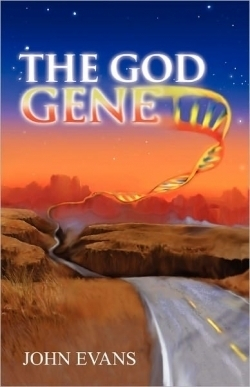The God Gene
Humans have always looked to the vastness of the heavens and the fathoms of the oceans for something or someone bigger than themselves—to worship, to hold in awe, and to revere. The God Gene is biologist and science educator John Evans’ offering of an action-adventure that doubles as a scientific and philosophical treatise on why humanity seems to be hardwired to seek God, gods, and magic.
The novel’s three main characters—best friends Oz, Spencer, and Katherine—celebrate their high school graduation. On that day, seven students are killed. Evans’ description calls to mind scenes from the Bible. He writes, “At first there was a whooshing sound, then the ground shook violently and a loud poof of air shattered the safety glass in the large window high up the north wall of the gym raining tiny pieces of glass on the students below…” A brick wall seemingly buries the three friends, but miraculously they are unharmed.
Moving forward in time, Oz and Katherine are married, Spencer is still their best friend. Oz and Spencer are weekend Harley Davidson enthusiasts and they take many road trips with Katherine’s support. Things seem fine among the trio; even the sexual tension between Spencer and Katherine appears normal. Oz, who was always a science geek, is now a biochemist. He discovers what might possibly be the “God Gene,” a chemical that “is psychoactive and has some kind of function in the human brain” and could possibly control the way humans think and behave.
Somehow word gets out about Oz’s discovery and there is a rash of break-ins at his lab and home. He and Katherine are accosted by many different organizations, including the FBI, the Vatican, and multi-billion-dollar pharmaceutical companies. All of these groups want Oz to turn over his research and work for them because whoever owns the God Gene could control the world. As such, they will do anything to acquire it, including industrial espionage, bribery, kidnapping, or even murder.
Evans attempts to engage readers by combining elements from the works of techno-thriller authors like Tom Clancy and Michael Crichton with the spiritualism of Carlos Castaneda, Dan Millman, and Robert M. Pirsig. Unlike these masters, however, Evans occasionally includes expository material that gives away his plot points.
The author’s theories are given voice through Oz; while Spencer is used as devil’s advocate, a technique that sometimes comes across as clunky. Readers will find the friendship of Oz, Spencer, and Katherine so realistic they may, however, be able to overlook this heaviness. In fact, the dynamics between the threesome add originality and power to the novel and will keep the audience interested.
As an educator, Evans naturally tries to give readers a lesson, and thus, they might forgive him when he comes across as preachy. Whether or not they forgive Evans for shining the light of truth on the raw nerve of unchanging human nature is unknown.
Reviewed by
Lee Gooden
Disclosure: This article is not an endorsement, but a review. The publisher of this book provided free copies of the book and paid a small fee to have their book reviewed by a professional reviewer. Foreword Reviews and Clarion Reviews make no guarantee that the publisher will receive a positive review. Foreword Magazine, Inc. is disclosing this in accordance with the Federal Trade Commission’s 16 CFR, Part 255.

